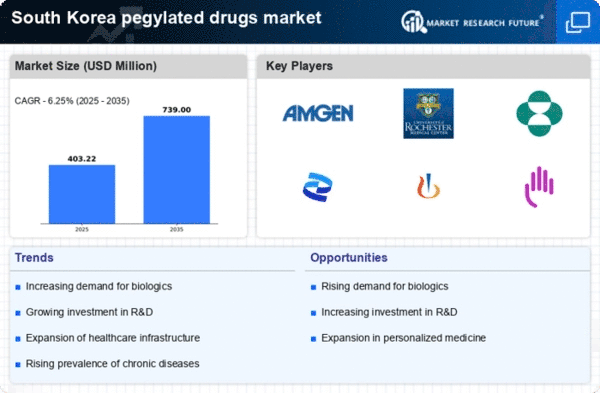Growing Investment in Biotechnology
Investment in biotechnology is surging in South Korea, serving as a significant catalyst for the pegylated drugs market. The government and private sector are channeling substantial funds into research and development initiatives aimed at advancing biopharmaceutical technologies. This influx of capital is likely to accelerate the discovery and commercialization of pegylated drugs, which are increasingly recognized for their therapeutic potential. The pegylated drugs market stands to gain from this trend, as enhanced funding supports innovation and the development of new therapies that address unmet medical needs.
Advancements in Drug Delivery Systems
Innovations in drug delivery systems are significantly influencing the pegylated drugs market. Enhanced delivery mechanisms, such as targeted delivery and controlled release, are being developed to improve therapeutic efficacy and patient compliance. Pegylation technology allows for the modification of drug properties, leading to improved solubility and bioavailability. In South Korea, the integration of nanotechnology and biocompatible materials in drug formulation is gaining traction. This evolution in drug delivery systems is expected to propel the pegylated drugs market forward, as healthcare professionals increasingly adopt these advanced therapies to optimize treatment outcomes.
Increasing Prevalence of Chronic Diseases
The rising incidence of chronic diseases in South Korea is a pivotal driver for the pegylated drugs market. Conditions such as cancer, diabetes, and autoimmune disorders are becoming more prevalent, necessitating innovative treatment options. Pegylated drugs, known for their extended half-life and reduced immunogenicity, are increasingly being utilized in therapeutic regimens. According to recent health statistics, chronic diseases account for approximately 80% of healthcare expenditures in the country. This trend indicates a growing demand for effective therapies, positioning pegylated drugs as a vital component in the treatment landscape. The pegylated drugs market is likely to benefit from this increasing patient population, as healthcare providers seek advanced solutions to manage these complex conditions.
Regulatory Support for Biopharmaceuticals
Regulatory frameworks in South Korea are becoming increasingly supportive of biopharmaceutical innovations, which is a crucial driver for the pegylated drugs market. The government has implemented policies aimed at expediting the approval process for new drugs, particularly those that demonstrate significant therapeutic benefits. This regulatory environment encourages research and development in the pegylated drugs market, fostering a landscape where biopharmaceutical companies can thrive. As a result, the number of pegylated drugs entering the market is expected to rise, providing patients with more treatment options and enhancing overall healthcare outcomes.
Rising Awareness of Personalized Medicine
The growing awareness and acceptance of personalized medicine in South Korea is driving the pegylated drugs market. Patients and healthcare providers are increasingly recognizing the benefits of tailored therapies that consider individual genetic and phenotypic characteristics. Pegylated drugs, with their ability to enhance drug efficacy and minimize side effects, align well with the principles of personalized medicine. This shift in treatment paradigms is likely to expand the pegylated drugs market, as more healthcare professionals adopt these innovative therapies to provide customized treatment solutions for patients.




















Leave a Comment